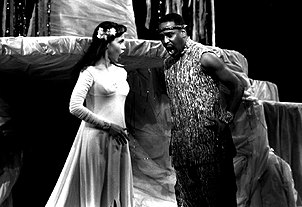








There has been an explosion of emotion since Director of Opera Judith Layng announced her departure at the end of this academic year. She made her Oberlin directorial debut with A Midsummer Night's Dream, and 17 years later she will wrap up her career with the same opera, presented in a very different light.
She didn't realize that this year's operas mirrored the selections made for her first year at Oberlin, in 1979. At the time MSND was considered very new, with modern music that the students had a difficult time picking up. This time around it has been easier for the students, but not because they were relying on the last performance of the opera. Layng restages operas every time she directs them, for she believes "if you stay static, you're dead creatively." Her first production was staged in Elizabethan costume; this time around the performers will wear costumes reminiscent of the '60s. Layng never has any problems coming up with ideas, just choosing the ones she will use.
Layng is taking early retirement, which was offered to Oberlin faculty earlier this year. It was a sudden decision, but one she made so she can pursue other interests that she hasn't had time for since she began working at Oberlin. She plans to finish articles and research that she started during her sabbatical, and also hopes to polish up translations she has done. She hopes to begin a new career, and wants to follow up on previous offers that she wasn't able to take. She has enjoyed working at Oberlin, and is "delighted with the talent in both the students and professionals."

Many of Layng's colleagues learned from her expertise and extensive knowledge of all aspects of the opera. Assistant Music Director of Opera and Theater Alan Montgomery told how she researched words in MSND that she did not fully understand, and how she found the one sentence added to Shakespeare's text, included to complete the significantly abridged first act. She also puts extra pressure on herself by double-casting performances, as she did with Marriage of Figaro, to give more students an opportunity to perform.
There has been dissent among students about Layng and her style of directing. Associate professor of Theater and Dance Chris Flaharty said, "In collaborative arts, it's exacting yet very, very tough to work with people in creative ways because the influx of creative ideas is overwhelming, [you] can't have whoever doing whatever they want. So it's hard for people to deal with it when their ideas have been compromised."
One student said, "[Layng] doesn't give the freedom of interpretation to the performers that they need to have for their roles... [and it] makes everything look mechanical. [The performers] look like robots."
Someone else noted her "antiquated blocking" was frustrating, and added that she does let the students formulate their own ideas, but within her framework.
Students have complained that Layng does not take suggestions from other people, and does not allow cast members to help each other. Montgomery said she "expects no kidding around on stage, and a professional attitude."
That attitude may scare off many students who are used to the relaxed atmosphere that goes with student-run theater productions at Oberlin; many find it too strict. Conservatory senior Abra Bush felt that the professional outlook will make it "easier to step into the real world and graduate because of the high caliber of work that she expects." It has also taught students how to work in difficult situations and stay professional.
Associate Professor of Theater Jean Armitage feels that much of the negative attitude is due to the fact that "we don't value what we're familiar with."
Waldo Gonzalez, a Double-degree junior feels that "part of it is that you get into this atmosphere, you hear negative stuff and you expect it; it's there before you get there."
Layng will be missed, even by the students who are inclined to complain. She is still important in her field even after all the years of teaching and directing at Oberlin, and has brought prestige to the opera program here with her arrival. Both students and colleagues felt honored to work with her.
Montgomery said, "Judith has such vitality, to the sense you'd think she'd go on forever." Layng feels she is "ready for new challenges" and is ready to take part in the evolution she talks about in the world of performing arts.
You don't say: Madga Rodriguez and Derek Lee Ragin OC '80 chew the fat. (photo by John Seyfried)

Copyright © 1996, The Oberlin Review.
Volume 124, Number 18; March 15, 1996
Contact Review webmaster with suggestions or comments at ocreview@www.oberlin.edu.
Contact Review editorial staff at oreview@oberlin.edu.